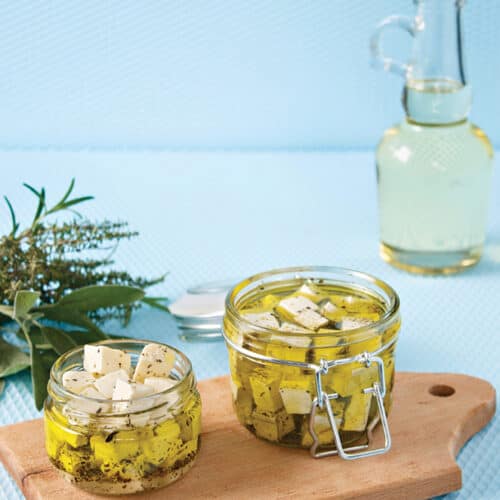There are two categories of DIY marinated feta cheese: the “Oh NO! I forgot to make an appetizer!” marinated feta and the “Oh YES! I am so glad I have a jar in the fridge” marinated feta.
Both deserve a place in any cheese lover’s repertoire. The differences between the two, though, center on the feta form, type of oil, potential flavor agents, and time it takes to get to the table.
Oh NO! marinated feta requires a block of feta (8 ounces will serve 4 as a starter). Bring the cheese to room temperature (an hour on the counter or 10 to 15 seconds on low in the microwave) so it better absorbs the flavors you’ll be adding to it. Use top quality olive oil (about one-third cup) because the bold, nutty flavor will add dimension to this quickly fixed dish. The spices should be freshly ground (a quarter teaspoon of black or red peppercorns is sufficient), the herbs freshly chopped (a tablespoon of oregano or thyme will do nicely), and citrus freshly zested (lemon, lime, or oranges work well) for maximum flavor impact. While feta is already quite salty, Oh NO! marinated feta benefits from a sprinkling of flaky sea salt and being served with crusty bread. No one will know you’d forgotten to make an appetizer.
Oh YES! marinated feta requires the feta to be cut into half-inch cubes (about 6 to 7 ounces fits in a quart canning jar) so that the flavors can penetrate the cheese from all sizes. It’s best to use a feta that has been soaking in brine as our recipe testing proved it absorbs the flavors in the marinade better than plastic-wrapped blocks. Use a mix of decent olive oil and neutral oil (such as canola or grapeseed) because you need at least three-quarters cup to cover the cheese, and there is no sense wasting high-quality olive oil—its bold, nutty flavors will be masked by the herbs and spices it will be sitting with for a longer marinating time. Spices should be kept whole (whole peppercorns and chili pepper flakes as opposed to ground cayenne pepper), herbs can be added stems and all, and citrus peels should be added in wide swaths.
Oh YES! marinated feta needs to sit in the refrigerator for at least one week but can stay there for up to a month. You can use this long-marinated feta to top salads, add flavor to baked shrimp dishes, or stir into hot pasta for a weeknight meal. Or you can eat it straight from the jar, slathered on crusty bread for a snack.

Aleppo Pepper and Triple Lime Marinated Feta
Ingredients
- 2 whole lime leaves
- 6-7 ounces brined feta, drained and cut into ½-inch cubes
- 1 lime zest removed in wide pieces and juiced
- 1 tablespoon Aleppo pepper
- 1/2 cup olive oil
- 1/4 cup neutral oil
Instructions
- Place 1 lime leaf in the bottom of a wide-mouthed quart jar. Place half of the feta in the jar.Sprinkle half of the Aleppo pepper over the cheese and layer half of the lime zest on top. Add the rest of the cheese and top with remaining Aleppo pepper and lime zest. Add oils and lime juice.
- Cover and give the jar a gentle shake. Refrigerate for 1 week. Before using, let the jar come to room temperature as the oils will have solidified. Store in refrigerator for up to 1 month.
UPCYCLED MARINATED FETA OIL
- Don’t waste the oil that’s been used to make marinated feta once the cheese is all gone.
- Unstrained (there will be flecks of cheese in this), use it to marinate chicken or lamb, or drizzle it over baked fish, roasted winter squash, grilled summer vegetables, or a Greek-inspired pizza.
- Strained, use it to confit tomatoes, cook ground chicken destined for tacos, or sauté broccoli.




